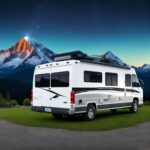It’s a serene evening, and you’re nestled amidst nature, embraced by tranquility. Your RV, your home-on-wheels, sits gracefully beneath the sprawling sky. But ah! The serenity is nudged by a subtle realization – your RV converter is not charging the battery. A conundrum, indeed, yet one that is navigable. Let’s embark together on a journey through the meandering paths of troubleshooting, ensuring your rolling abode is always aglow with the pulsating vigor of unyielding power.
Where Power Flow Stutters: Recognizing the Issue
Observing the Telltale Signs: Within the cozy walls of your RV, lights flickering or dimming whimsically, or accessories acting sluggish, are often the subtle whispers of a converter reluctantly holding back the charge. Your first step is to lend an ear to these signs, acknowledging their subtle nudge towards attention.
Testing the Terrain: Armed with a multimeter, venture into assessing the converter’s output, ensuring it propels forth around 13-14 volts, the optimal cradle where your RV’s electrical heartbeat pulsates rhythmically.
Entwining Technicality with Simplicity: The Troubleshooting Dance
Inspecting the Fuses: The fuses, silent guardians of your electrical system, may sometimes falter. A visual inspection, ensuring none appear burnt or singed, offers your first glance into the potential roots of the hiccup.
Navigating Through Wires: The wires, akin to veins pulsating with power, demand your gentle gaze. Ensure connections are snug, and wires are free from any whimsical twists or undue pressure.
The Batteries’ Silent Plea: Sometimes, the batteries themselves whisper for attention. Ensuring they’re free from corrosion, and their water levels are optimal, promises a cascade of unhindered power from the converter.
Diving into Replacement: When the Converter Whispers a Farewell
There might come a moment when the converter, after years of persistent service, might seek retirement. Replacing it isn’t a tumultuous sea, but rather, a gentle stream, guided by selecting a compatible unit and ensuring connections are recreated accurately and securely.
Frequently Asked Questions
How do I know if my RV converter is functioning optimally? A fully functioning converter should provide an output of around 13-14 volts. Using a multimeter to check the voltage can offer a glimpse into its operational status.
What might be the reasons my converter isn’t charging the battery efficiently? Possibilities could range from flawed fuses, mischievous wiring, or the battery itself silently seeking attention through corrosion or inappropriate water levels.
How frequently should I inspect my RV electrical system to prevent surprise hiccups? Adopting a routine of a quick inspection before embarking on each journey ensures your travels are seamlessly illuminated by consistent power.
Can I replace the RV converter myself? While replacing the converter is navigable, ensuring accurate and secure connections is pivotal. If uncertainty lingers, seeking professional assistance promises peace of mind amidst your travels.
Can a faulty battery impact the converter’s functionality? Absolutely! Batteries demanding attention through corrosion or diminished water levels can silently stifle the efficient flow of power from the converter.
In the embrace of the sprawling landscapes and under the caress of the wandering breezes, ensuring your RV always pulsates with unwavering power becomes a gentle journey, navigated through attention and tender care. May your paths always be illuminated by the gentle glow of reliable power, and may your adventures weave tales of undisturbed joy and unhindered exploration. Your RV is not merely a vehicle; it’s a vessel crafting memories amidst the gentle lap of distant horizons. Let’s ensure it always pulses with the vibrant glow of consistent, unwavering power.
- Transform Your Health with Medford Medical Weight Loss Program - June 9, 2025
- A Chat with Nate and Mika, Christian Wedding Photographers - July 18, 2024
- Ultimate Guide To Playing Online Casinos - May 27, 2024









